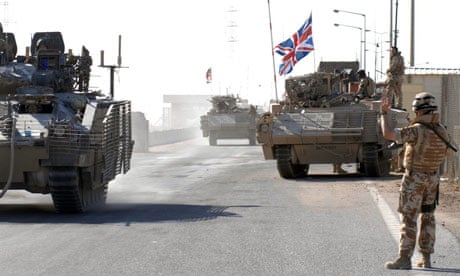A number of British military interrogators may face war crimes charges after members of their unit filmed themselves while threatening and abusing Iraqi detainees at a secret prison near Basra, the high court heard today.
The men have been referred to the Director of Service Prosecutions (DSP) after an investigation considered whether they had breached the International Criminal Court Act, which prohibits war crimes.
The referral was accompanied by "a recommendation that he consider charges under the 2001 Act", Philip Havers QC, counsel for the Ministry of Defence, told the court. He added that Article 8 of the act defines and prohibits a number of actions as war crimes, including "committing outrages upon personal dignity, in particular humiliating and degrading treatment".
It is thought that three men have been referred to the DSP. A number of other military interrogators – some of them reservists with the Territorial Army, and the Royal Navy and RAF reserves – are also under investigation and could also face war crimes charges.
The disclosure came at the end of proceedings brought on behalf of 222 Iraqi men who were detained by British forces following the 2003 invasion, in an attempt to force a public inquiry into allegations of systematic mistreatment.
The court was told there was evidence that detainees were starved, deprived of sleep, subjected to sensory deprivation, and threatened with execution at the shadowy facilities near Basra which were operated by the Joint Forces Interrogation Team.
It also received allegations that the team's prisoners were beaten and forced to kneel in stressful positions for up to 30 hours at a time. Some of the prisoners claim they were subject to sexual humiliation by women soldiers, while others allege they were held for days in cells as small as one-metre square.
Many of the detainees claim that before the interrogation sessions they were forced to run around an obstacle course while wearing blackened goggles, where they were kicked or beaten with rifle butts.
For reasons that remain unclear, many of the interrogation sessions were video recorded by the interrogators themselves. A team of military police, which has been investigating the allegations under the leadership of a retired former civilian detective, has seized a further 1,250 recordings which could be used as evidence during any future prosecutions.
The MoD told the court it believes a public inquiry would be costly and unnecessary, and says the military police team should be permitted to continue with its investigation.
